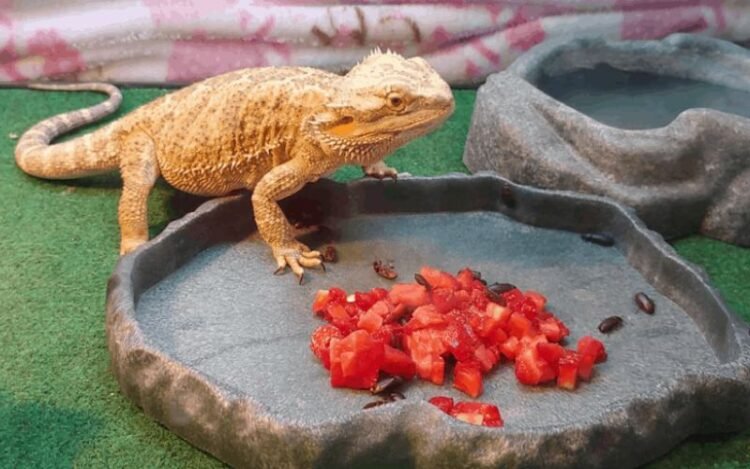
Bearded dragons are interesting creatures, and as a result of their distinct look and minimal maintenance requirements, they are frequently kept as pets. If you care about the health and happiness of your pet, you should provide it only the best food. Bearded dragon owners often wonder, “How often do you feed a bearded dragon weekly?” Bearded dragons have certain nutritional needs, and this book will help you learn more about those needs, as well as how to meet those needs in a way that keeps your scaly friend happy and healthy.
Learning About Bearded Dragon Diet
It is essential to understand a bearded dragon’s natural dietary needs in order to provide for it correctly. The diet of a bearded dragon includes both plant stuff and insects, making it an omnivore reptile. Leafy greens, vegetables, fruits, and a wide range of insects make up the bulk of their diet. Their health, growth, and development all depend on them eating properly.
How Often Do You Feed a Bearded Dragon Weekly?
Bearded dragons of varying ages have different food requirements. Younger dragons, in comparison to older dragons, need to be fed more frequently. Following is a summary of the feeding plan for your bearded dragon dependent on its age:
Bearded Dragon Puppies: What They Should Be Fed and When?
Young bearded dragons have a lot of energy and develop quickly. Their nutritional needs are best met by being fed several times a day. You should try to give them food at least thrice a day. This guarantees that they get the nutrition they need to grow and thrive.
Bearded Dragon Baby and Puppy Feeding Times
Bearded dragons in the juvenile stage are a bit older than newborns but are still developing physically. They need a balanced diet to fuel their growth. You should give them a varied diet of leafy greens, vegetables, and insects twice daily.
Bearded Dragon Adult Feeding Times
Bearded dragons achieve maturity at a different point in their feeding cycle than smaller dragons. Their metabolism is slower and they require less energy overall. They can get what they need from a single daily feeding. However, it is still important for their health that you give them a balanced diet.
Considerations for Establishing an Appropriate Feeding Schedule
Bearded dragons’ feeding schedules are affected by several factors, the most important of which being the animal’s age.
Different dragons have different nutritional needs because of their differing metabolic rates. Constantly checking their weight and adjusting their feeding regimen as needed is a must.
Bearded dragons who get plenty of exercise may need more food than less active reptiles. If you are unsure if a change is needed to the feeding schedule, simply observe their behavior and energy levels.
Metabolic bone disease, obesity, and other health issues may necessitate a change in one’s dietary habits. Seek out the guidance of a qualified reptile vet if you suspect that your bearded dragon has any underlying health issues.
FAQs
How often must I change the insects I give my bearded dragon?
Daily insect diets are quite fine for bearded dragons. They get the protein and other elements they need from the insects they eat. However, it is essential to provide a wide range of insects to promote nutritional diversity. Crickets, mealworms, dubia roaches, and phoenix worms are just a few of the insects that would do.
Do I Need to Sprinkle Calcium and Vitamin Powder on Bugs?
Feeding your bearded dragon insects dusted with calcium and vitamin supplements is a good idea. Their nutritional needs, notably for calcium and vitamin D3, can be met with the use of these supplements. By dusting the insects, you can be sure that your dragon will get the calcium, phosphorus, and magnesium it needs to grow strong bones and avoid metabolic bone disease.
Do Bearded Dragons like to snack on fresh produce?
Absolutely! Bearded dragons are omnivores and can feast on a variety of fresh produce. You can’t go wrong with dark, leafy greens like kale, collards, and mustard greens. They should account for the bulk of your dragon’s vegetarian diet. Fruits like strawberries, blueberries, and melons cut into slices might also be offered on occasion.
When feeding my Bearded Dragon, how do I know if I’m giving too much or too little?
You can tell if you’re overfeeding or underfeeding your bearded dragon by keeping an eye on its weight and studying its behavior. You may be overfeeding your dragon if it develops excess fat, loses energy, and stops eating as much. On the other hand, they may be undernourished if they are noticeably skinny, lethargic, or aggressive. Get the advice of a vet who specializes in treating reptiles before making any changes to their diet.
Is it okay for my bearded dragon to leave food out overnight?
You shouldn’t leave out food for your bearded dragon overnight. When food is kept out for too long, it tends to spoil and become infested with insects. Fresh food should be provided during their active hours, and leftover food should be thrown away within a few hours to keep things clean and avoid the spread of disease.
How do I get my bearded dragon to eat?
Stress, illness or environmental conditions are some possible reasons why your bearded dragon may be refusing food. Lighting and temperature in their enclosure should be checked frequently to ensure optimal feeding conditions. If the problem persists, a reptile veterinarian can give you the best advice after a thorough examination.
Conclusion
The health and happiness of a bearded dragon depends on getting the right nutrition. If you know their specific dietary needs and follow a proper diet plan, you can provide them with the nutrition they need. Take into account their age, metabolism, amount of exercise and any underlying health concerns when determining how often to feed them. Maintaining your husky friend’s satisfaction, health and nutrition requires consistent monitoring, observation and interaction with the reptile.
